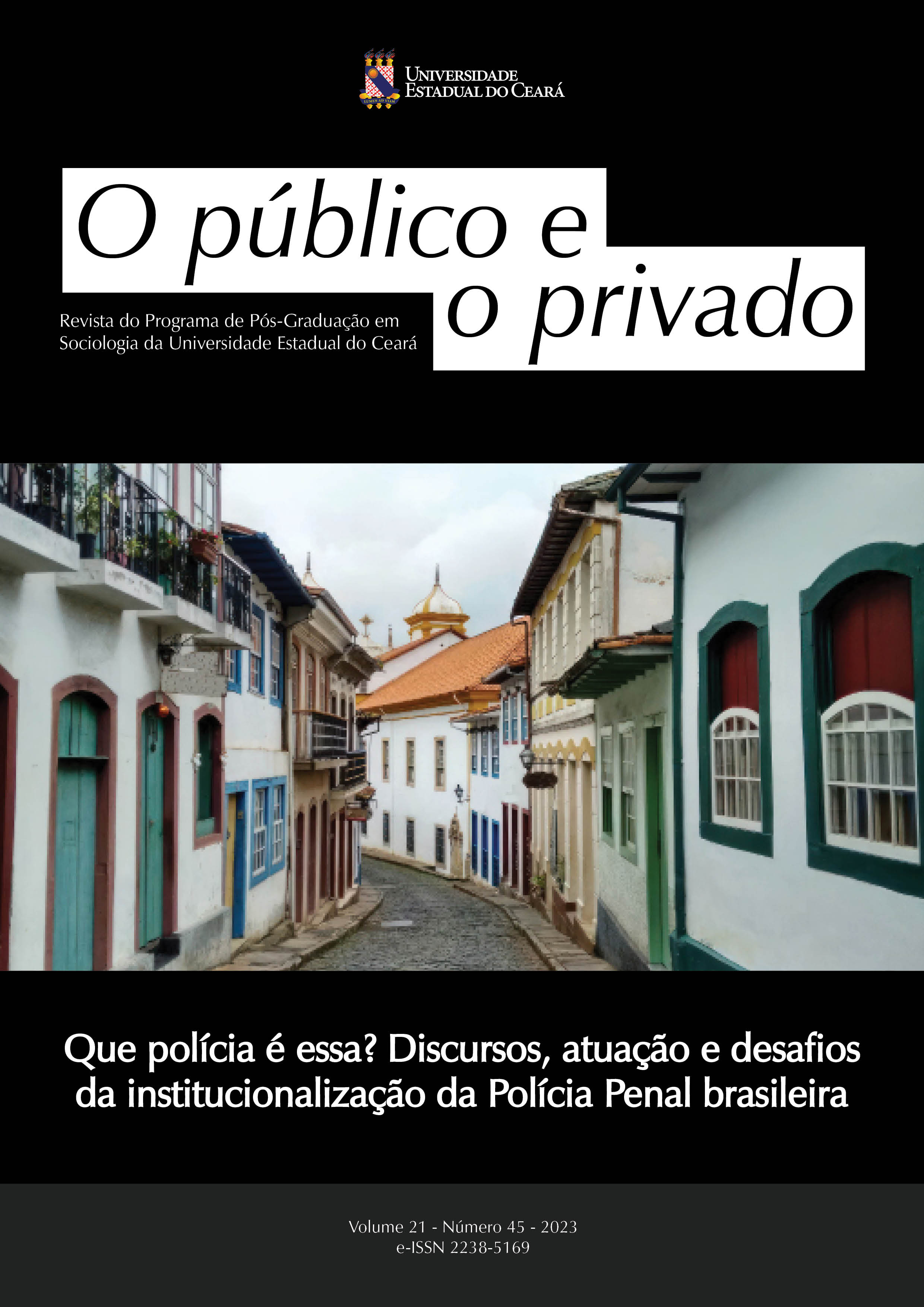O cotidiano do policial penal
aprender a trabalhar e conviver na prisão
DOI:
https://doi.org/10.52521/21.10602Palavras-chave:
Policial Penal, Performance Emocional, Vulnerabilidade, PoderResumo
Este artigo busca analisar aspectos da construção da atuação como policial penal, a partir de profissionais em diferentes momentos da trajetória: desde os que estavam no curso de formação anterior ao início efetivo como policial penal, até aqueles com mais de 20 anos na função. Os dados foram coletados entre os anos de 2014 e 2018 em Salvador-BA, por meio de entrevistas semiestruturadas, mediante termos de consentimento, e análise inspirada na Teoria Fundamentada, com considerações a partir do conceito de performance emocional proposto por Crawley (2004) e da sociologia das prisões. Os resultados apontam a convivência e a interação com os privados de liberdade como uma das principais atribuições desses profissionais, que possibilita o desenvolvimento um saber que é próprio desta categoria profissional: a habilidade de conviver e mediar situações de tensão e privação cotidianas na prisão e de reconhecer sinais de alterações no pátio. Ao mesmo tempo, destacam que as características dessas interações têm a ver com a experiência e o significado atribuído à ocupação, aos sentimentos de vulnerabilidade e poder que se apresentam na relação com as pessoas em privação de liberdade e com as estratégias desenvolvidas por cada um, a partir da sua subjetividade, para lidar com o contexto prisional.
Referências
BATISTA, A.S. Estado e controle nas prisões. Cad. CRH [online]. 2009, v.22, n.56 [cited 2018-10-02], pp.399-410. Disponível em: http://www.scielo.br/scielo.php?script=sci_arttext&pid=S0103-49792009000200013&lng=en&nrm=iso>. ISSN 0103-4979. http://dx.doi.org/10.1590/S0103-49792009000200013.
BOURDIEU, P. A dominação masculina. 2 ed.,Rio de Janeiro: Bertrand Brasil, 2002
CAMPOS, M.S.; ALVAREZ, M.C. Pela metade: Implicações do dispositivo médico-criminal da “Nova” Lei de Drogas na cidade de São Paulo. Tempo soc., São Paulo , v. 29, n. 2, p. 45-74, Maio 2017 . Disponível em: <http://www.scielo.br/scielo.php?
CASTRO E SILVA, Anderson Moraes. Nos braços da lei: O uso da violência negociada no interior das prisões. Rio de Janeiro: e+a, 2008.
CHIES, L.A.B. Apontamentos teórico-operacionais para uma sociologia das prisões. In: SANTOS, JVT., TEIXEIRA, NA., and RUSSO, M., orgs. Violência e cidadania: práticas sociológicas e compromissos sociais[online]. Porto Alegre: Sulina; Editora da UFRGS, 2011. Cenários do conhecimento series, pp. 388-410. ISBN 978-85-386-0386-3. Available from: doi: 10.7476/9788538603863. Also available in ePUB from: http://books.scielo.org/id/ycrrp/epub/santos9788538603863.epub.
CLEMMER, D. The prison community. New York, Holt, Rinehart & Winston, 1958.
COELHO, EC. A oficina do diabo. Crise e conflitos no Sistema Penitenciário do Rio de Janeiro. Rio de Janeiro: Espaço & Tempo, IUPERJ, 2005 [1987].
CRAWLEY, E.M. Emotion and performance : Prison officers and the presentation of self in
prisons. Punishment & Society, 2004 6: 411 DOI: 10.1177/1462474504046121
___________. Doing prison work. New York: Routledge, 2011.
GARLAND, D. A cultura do controle. Crime e ordem social na sociedade contemporânea. Tradução: André Nascimento. Rio de Janeiro:Editora Revan, 2008
GOFFMAN, E. Manicômios, prisões e conventos. São Paulo: Ed. Perspectiva. 1999
KAUFFMAN, K. Prison Officers and Their World. Cambridge, Mass.: Harvard University Press, 1988 290 pp.
KING, R. D. Prison staff: an international perspective. In: BENNETT, J. Et al.
Understanding Prison Staff. Willan Publishing, United Kingdom, 2008. p 30-47
MORAES, P.R.B de. Punição, Encarceramento e Construção de Identidade Profissional entre agentes penitenciários. Ibccrim, 2005.
___________. A identidade e o papel de agentes penitenciários. Tempo soc., São Paulo , v. 25, n. 1, p. 131-147, Junho 2013 . Disponível em: http://www.scielo.br/scielo.php?script=sci_arttext&pid=S0103-20702013000100007&lng=en&nrm=iso. Acesso em 08 Julho 2017. http://dx.doi.org/10.1590/S0103-20702013000100007.
PONCIONI, P. Tendências e desafios na formação profissional do policial no Brasil
Revista Brasileira de Segurança Pública. Ano 1, Edição 1, 2007
RAMALHO, J.R. O mundo do crime. Rio de Janeiro: Graal, 1979.
SALLA, F.. As rebeliões nas prisões: novos significados a partir da experiência brasileira. Sociologias, Porto Alegre , n. 16, p. 274-307, Dez. 2006 . Disponível em <http://www.scielo.br/scielo.php?script=sci_arttext&pid=S1517-45222006000200011&lng=en&nrm=iso>. Acesso em 23 Set. 2018. http://dx.doi.org/10.1590/S1517-45222006000200011.
SYKES, GM. The society of captives: A study of maximum security prison. Princeton
University Press, 2007.
TAIT, S. Prison Officers and gender. In: BENNETT, J. Et al. Understanding Prison Staff. Willan Publishing, United Kingdom, 2008. p 30-47
TAROZZI, M. O Que É um Grounded Theory? Metodologia de Pesquisa e de Teoria fundamentada nos Dados. Petrópolis, RJ: Vozes. 2011
THOMPSON, A. A questão penitenciária. Rio de Janeiro: Forense, 1980.
Downloads
Publicado
Como Citar
Edição
Seção
Licença
Copyright (c) 2023 Leticia Chaves Monteiro

Este trabalho está licenciado sob uma licença Creative Commons Attribution 4.0 International License.











